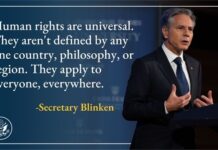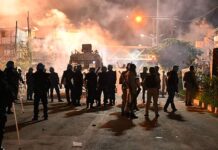Lack of a disciplined military under a strong chain of command did not exist immediately after the independence of Bangladesh in 1971. In addition, political opposition from JSD, alleged to have been created by India as an alternative to Awami League was a menace for Sheikh Mujibur Rahman. Add to that the corruption by the Awami League people right from the days of independence was creating havoc for his administration. He appointed the military to control widespread smuggling throughout the porous borders as there were no other credible forces available to him. Rakkhi Bahini, a paramilitary force of former freedom fighters (guerillas) was favored by him as he did not trust the military. He considered it to be a reliable, thanks to heavy indoctrination in loyalty to Mujib and the Awami League. The Rakkhis were however, no match for the regular forces in terms of firepower and failed to resist the coup that toppled Mujib in 1975.
The zealous young army officers were intercepting and arresting the smugglers in droves and looked forward to Sheikh Mujib for action. Observing that most of the criminals were Awami League adherents, he decided to free them. He told the military officers “you people see everything from one angle. You do not think about me at all. At one side my party and on the other side the military. What should I do? My hands are tied. I cannot go without my party.” Sheikh Mujib created BAKSAL to consolidate power in his hands to thwart opposition from political foes as well as from the military. That was the beginning of his downfall.
And now!
Sheikh Hasina has consolidated the police with her own selective process. Enhanced Rapid Action Battalion (RAB) who shoot and kill with impunity. Both of these organizations publicly side with the ruling party. The court system and the civil service has been politicized. International Crimes Tribunal is rightfully taking aim at the criminals who were active against the Bengalis during the war of liberation but it is more aimed to set a score against the opponents to her rule. She assumed a mandate as the head of state for another 5 year term through a flawed election on January 5, 2014. A sham Shahbagh movement was created to counter opposition to her and in support of a brutal action against the Islamists. Once the Islamists were subdued, Shahbagh movement was put under control and is merely flickering in the shadow.
A little bit about the past. On March 24, 2982 the Army Chief General Hussain Mohammed Ershad illegally removed BNP government and took power in his hands and called for an election. Sheikh Hasina proclaimed, anyone who will take part in that election would be enemies of the nation. Within 21 hours after making that proclamation, Awami League in coalition with Jamaat joined the electoral process leaving BNP in quandary by itself. BNP did not participate in the election of 1988 also. After the fall of the Ershad government on 17th February, 1991 Khaleda Zia was personally elected from 5 seats in the parliament making her the Prime Minister. It was the first free election in Bangladesh history. Awami League’s cooperation with Jamaat once again took place in 1996 when Khaleda Zia ran an election with Awami League abstaining. This establishes the Sheikh Hasina’s deals with Jamaat. Now Jamaat is cooperating with BNP for each other’s survival and therefore, Sheikh Hasina found it convenient to begin an International Crimes Tribunal. While this trial should have been a done much earlier, but this time it is of a great advantage to Awami League. It is now a political ball game. If BNP leaves Jamaat coalition, it is alleged Awami League will pick-up Jamaat in their coalition. It all appears to be a political chess and very little to do with national interests.
Just like political chess, corruption under Sheikh Hasina has reached to an extreme level. Contracts have been awarded to favorable entities under a political cloak. The student league (Chatra League), the student body of Awami League has taken control of the major campuses and made them into forts. They brandish firearms and machetes when directed to subdue opposition. Their coffers swelled by taking control of all government tenders illegally. Just like Sheikh Mujib, Sheikh Hasina is looking other way to Awami League sponsored looting. Only difference this time is, the economy is surging despite all the corruption; thanks to the foreign currency receipts from our workers in the Middle East and other countries. The middle class businesses have prospered owing to hard work as corruption did not touch this group. The rich class is small and thus enjoy all the facilities. They have foreign bank accounts as well as foreign assets and are very mobile. They can shift to any other country in case a bloody usurpation occurs in Bangladesh.
Since the liberation in 1971, there was never been a more grievous time for the nation of Bangladesh. Previously the nation suffered moments of harrowing tragedy like the gruesome murders of its leaders and war heroes (most notably Bangabandhu and President Zia), the deadly famine of 1974 and the calamitous cyclones and floods. But never before has the entire nation remained strangulated continuously for so long by gulping fear and insecurity, living and livelihood perilously incapacitated across the land, and yes, very regrettably, freedom of expression and democracy exiled from the very land that sacrificed three million of its own for this very cause. Can we ask the two great leaders; the Honorable Jananetri (PM Sheikh Hasina) and the Honorable Deshnetri (Ex-PM Khaleda Zia), to look into the mirror and ask if they look like their true selves? Are they working for the people or for their parties only?
Time is clicking and Bangladesh needs an election supervised by a totally independent election commission followed by reformation of the legal system, police and the civil service. We need to trickle power to lowest denominator; the local governments and not keep all power to the members of the parliament. Lot of work needs to be done. The question is; who will supervise this transition? Who will take the first step to put the nation into the orbit of development again?









